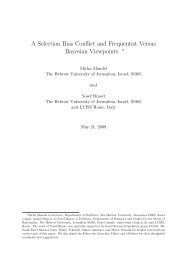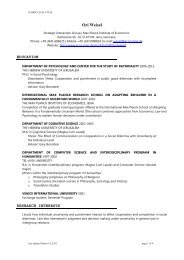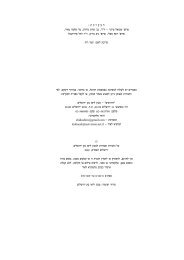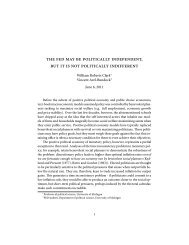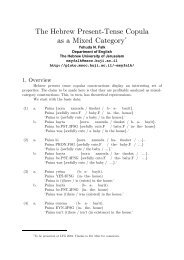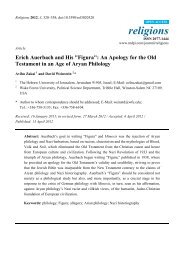Transitive verbs with non-accusative alternation in ... - Pluto Huji Ac Il
Transitive verbs with non-accusative alternation in ... - Pluto Huji Ac Il
Transitive verbs with non-accusative alternation in ... - Pluto Huji Ac Il
Create successful ePaper yourself
Turn your PDF publications into a flip-book with our unique Google optimized e-Paper software.
86<br />
Rivka Halevy<br />
between the A and the O, e.g. šavar ‘break’ <strong>in</strong> (51), haras ‘ru<strong>in</strong>’ <strong>in</strong> (52) and<br />
‘iqem ‘distort’ <strong>in</strong> (53):<br />
(51) ??hu’ šavar ‘ota ba-'etsba'<br />
he broke OM-her on-the-f<strong>in</strong>ger<br />
(52) ??hu’ haras 'ota ba-gav<br />
he ru<strong>in</strong>ed OM-her on-the-back<br />
(53) ??hu’ 'iqem 'oti ba-'etsba’<br />
he bent OM-me on-the-f<strong>in</strong>ger<br />
5.2.2. Causative/<strong>in</strong>choative <strong>alternation</strong><br />
The transitivity causative/<strong>in</strong>choative <strong>alternation</strong> is available for pure change<br />
of state <strong>verbs</strong> but not for transitive <strong>verbs</strong> that <strong>in</strong>corporate a feature of<br />
‘contact’. Compare, for <strong>in</strong>stance, the causative <strong>in</strong>terpretation triggered by<br />
(54a) and the passive sense rendered by (54b), which are realized <strong>in</strong> the<br />
verb-form of NIF’AL 20 (e.g. nextax ‘cut/was cut’) as opposed to the<br />
m<strong>in</strong>imal pair (55a) and (55b), where the <strong>alternation</strong> <strong>with</strong> the passive verbform<br />
can trigger both a passive and an <strong>in</strong>choative <strong>in</strong>terpretation, depend<strong>in</strong>g<br />
on the contextual environment.<br />
(54) a. rut xatxa 'et ha-basar<br />
Ruth cut OM the-meat<br />
‘Ruth cut the meat’<br />
b. ha-basar nextax<br />
the-meat was-cut<br />
‘The meat was cut’<br />
(55) a. dani šavar 'et ha-kos<br />
Dani broke OM the-glass<br />
‘Dani broke the glass’<br />
b. ha-kos nišbera<br />
the-glass {was-broken/broke}<br />
‘The glass {has been broken/broke}’<br />
In (55), the verb šavar ‘break’ is a pure change of state verb; therefore it<br />
can basically be realized <strong>with</strong> a one-place predicate construction, i.e. <strong>with</strong> a<br />
s<strong>in</strong>gle argument denot<strong>in</strong>g the entity undergo<strong>in</strong>g a change of state, as shown



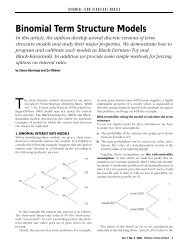
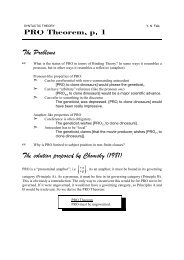
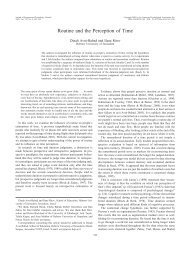
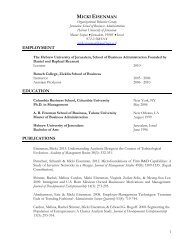
![CV [PDF] - Pluto Huji Ac Il](https://img.yumpu.com/18174585/1/190x245/cv-pdf-pluto-huji-ac-il.jpg?quality=85)
